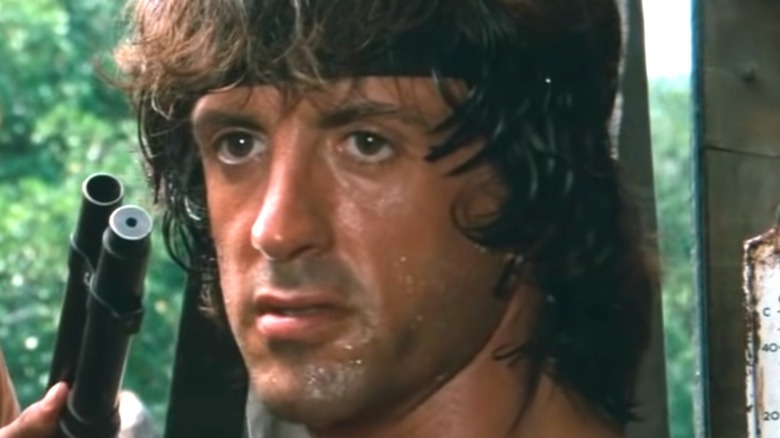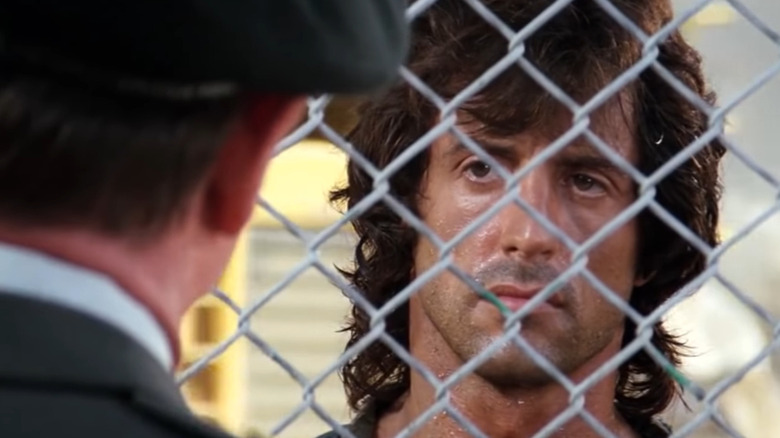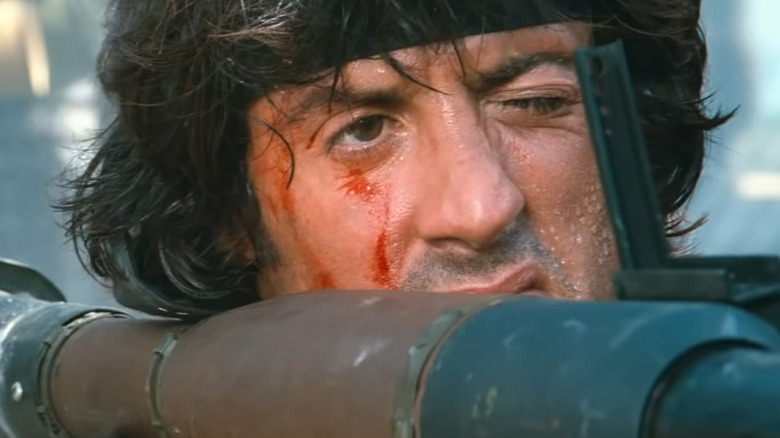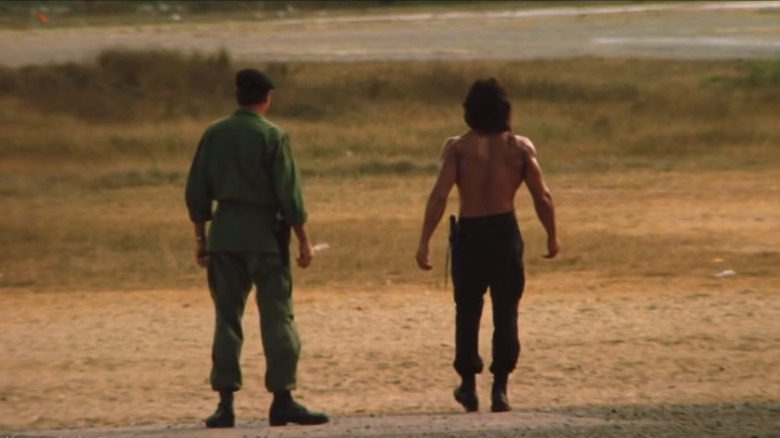The Ending Of Rambo: First Blood Part II Explained
Sylvester Stallone was on a roll in the 1980s, continuing to direct and star in the "Rocky" sequels while featuring in countless other movies, both good and bad. However, his claim to fame from that decade — and almost certainly his most famous character next to the Italian Stallion — would be John Rambo, who first hit theaters with the 1982 hit "First Blood."
Based on the 1972 novel of the same name, "First Blood" — which Stallone also co-wrote — was the success that spawned a franchise, which truly took off with 1985's "Rambo: First Blood Part II." The follow-up sees John Rambo, three years after the events of the first film, being released from prison to go on a new mission where he is assigned to document prisoners of war in Vietnam. He proceeds to make a daring effort to rescue them, despite being given strict orders not to. The film remains the highest-grossing in the five-film franchise, grossing over $300 million during its original release (via Box Office Mojo). Sadly, it didn't fare as well with critics, especially in comparison to its predecessor, currently having only a 33% Tomatometer score on Rotten Tomatoes.
Complete with endless gunfire, gnarly kills, and a shirtless Sylvester Stallone delivering the meanest one-liners to ever be dished out, "Rambo First Blood: Part II" diverged from the more somber and introspective tone of its predecessor to instead build up a new (and highly influential) breed of American hero. However, "First Blood Part II" still has some unique themes and ideas at play worth pondering, so let's take a dive into the super sequel, see its impact on Rambo's overall story, and consider what it all means.
Who gets to win?
After the events of "First Blood," where Vietnam War veteran Rambo went up against an entire town's police force, he starts the sequel while still in prison after turning himself in at the end of the last movie. He is called by Colonel Sam Trautman (Richard Crenna) to once again serve his country, with the intention being for Rambo to photograph POWs in the jungles of the Southeast Asian country. Rambo accepts the mission, but asks Trautman, "Do we get to win this time?" to which Trautman replies, "This time it's up to you."
This can be seen as a simple reference back to the first movie, where Trautman was key in getting Rambo to surrender to the police force. Now Rambo, having only known prison life for the last three years, is given the chance to leave this lonely existence and start a new life where he is in charge of his destiny. But at the same time, the movie uses this simple setup as a means of commenting upon the film's greater themes and his own world views. Just as his time in Vietnam saw the determined Rambo go through endless struggle for the sake of his country, only to be left to the wayside following it, the same bureaucratic system asks for his services once more, while leaving his chances of survival in his hands.
A one-man war
Rambo meets with Major Marshall Murdock (Charles Napier), who temporality allows Rambo back into the army to complete his task. The catch for Rambo's mission, however, is that he is not permitted to save any of the prisoners. Once reaching Vietnam, it doesn't take long for Rambo to defy his orders and begin rescuing suffering prisoners. Murdock abandons Rambo once this is discovered and we learn that Murdock practically set Rambo up to fail, believing that he wouldn't find anyone — and even if he did, they would have abandoned him anyways, with the mission being more concerned with appeasing public concerns about US POWs left in enemy custody following the war.
So, Rambo becomes a one-man army, slaughtering through both the Vietnam and Soviet troops until he finally saves his fellow men.
The greater context of what Stallone and company are aiming to communicate can't be ignored. Rambo is truly on his own throughout the mission. And for as loud and brash as the film gets, there is a much more quiet, subtle clash of ideologies happening. Rambo is someone who will give everything for the greater good, selflessly putting himself in harm's way to save the prisoners. Meanwhile, the government sees his determination as an asset and the mission itself as nothing more than a way to ease the public, despite having the resources to save their own people. Rambo still prevails, showing just how far an individual can go with enough grit and drive.
Respect goes both ways
At the very end of "First Blood Part II," Rambo — after having succeeded at saving the prisoners — threatens Murdock to save the remaining POWs. Now free, Trautman asks Rambo what he'll do once he gets home, to which Rambo mentions that he doesn't intend to do so.
Murdock realizes Rambo's frustration with what happened, but he doesn't believe he should hate his country for it. Rambo gives a heartfelt speech, saying that he loves the United States and would proudly die for it, but wants to live in a country that will love him and other soldiers for all they do to protect it. And with that, he walks off into the distance to live life "day by day." As written by Benajamin Marra for Slant Magazine, "Even at the end, when Rambo delivers his passionate speech about what he really wants, we feel like righteous justice has been served."
It's a bittersweet end to an otherwise fun and high-octane experience. Rambo has come to realize that he is truly a lone wolf, even after all the sacrifice he has made for his homeland. And when returning home, Rambo and his fellow war-torn soldiers are given the sour end of the deal, coming back to contempt and ridicule by the country that they gave up so much for. Rambo's fight is no longer in the jungle or the battlefield — it's in, and to some extent against, his own home. It's a potent reminder to the audience that the only ones we should count on to ensure our happiness is ourselves. We all have battles to fight and it's up to us to push through and decide how we win.



